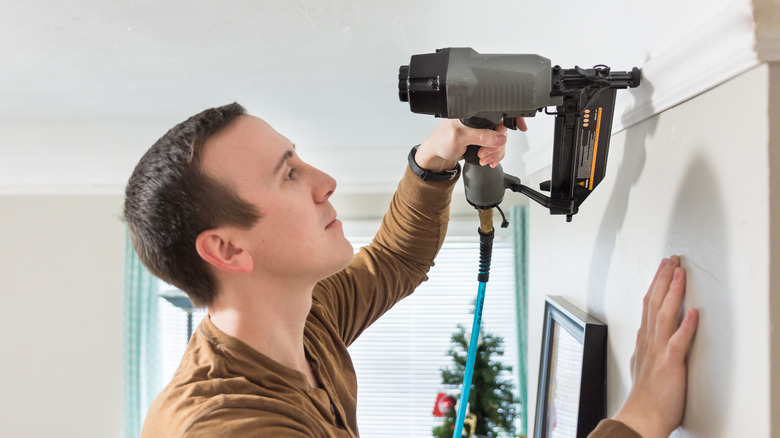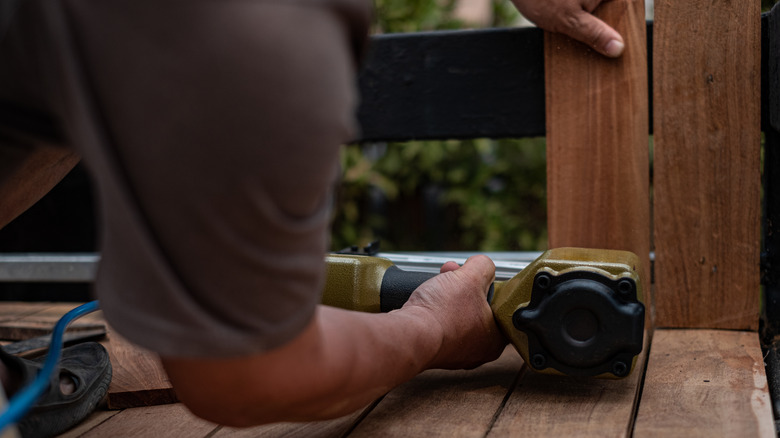
Brett Taylor/Getty Images
A hammer is essential for any home tool kit but can only get you so far. Some projects can be completed significantly faster and with cleaner results if you invest in a good nail gun. But what kind of nailer do you need? There are a lot of different options out there, and it can be hard to figure out which one is best suited to which tasks.
There are actually nine different kinds of nail guns for buyers to choose from: staple nailers, palm nailers, roofing nailers, pin nailers, brad nailers, flooring nailers, siding nailers, framing nailers, and finishing nailers. These are used for all kinds of different jobs, ranging from pinning down carpets to full-blown furniture making and cabinetry, but brad nailers and finish nailers are the two that most people will be considering in the power tool section of their local hardware store. This is because they are the most versatile varieties, making them the most frequently obtained for commercial and non-commercial use. Both varieties have electric options powered by batteries and pneumatic options requiring an air compressor. Both are also sold by numerous brands at a wide variety of price points. Here is a quick breakdown of what each of these nailers do and what kinds of jobs they’re best suited for.
What is a brad nailer used for?

Photovs/Getty Images
Brad nailers are significantly smaller than finish nailers and have a wide variety of applications. According to Home Depot, most brad nailers use thin, 18-gauge brads that range in size from ½-inch to 2-inches long. «They are small in diameter and have a small head. Brad nails provide a clean finish in various woodworking projects. They work best on thinner cuts of lumber such as fiberboard and plywood.» This makes brad nailers ideal for more detail-oriented jobs like molding and trim.
Want to pry off old, scuffed-up baseboards and lay in some new ones? If so, a brad nailer will become your best friend. The nails’ thinner diameter means they are much less likely to split wood, and the holes they make are significantly easier to conceal without the need for wood filler. This discrete installation makes them incredibly useful in various other woodworking tasks as well. They’re great for assembling window frames and attaching door jams and transition pieces. Many carpenters also use them to hold together pieces that are being glued when it’s difficult to apply adequate clamping pressure, like with the mitered corners of picture frames. That said, they’re not ideal for bonds that need to penetrate studs or joints that have to bear heavy stress.
What is a finish nailer used for?

Thicha Studio/Getty Images
A finish nailer is a more heavy-duty tool than a brad nailer, primarily because it uses much wider nails. Finish nailers typically use 15- or 16-gauge nails that range between 1-inch and 3 ½-inches in length. This means that they will be more likely to split wood and leave larger holes that need to be filled, but they are also stronger and provide the option to use much longer nails. Finish nailers, as a whole, are also better suited to outdoor projects, provided that they are paired with galvanized or otherwise adequately weather-treated nails.
According to This Old House, «[15-gauge] nailers are a great option for large interior and exterior casing when nailing into studs (not the jamb), installing pre-hung doors, stair treads or risers, baseboard, and crown—things that require good holding power in the material that can be filled and painted or stained.» The added width and larger nail head give them a much stronger hold.
Meanwhile, 16-gauge nails are slightly smaller and, therefore, more versatile. They’re sort of the jack-of-all-trades, master-of-none nail-size. A 16-gauge nail is wider than a brad but not as thick and sturdy as the 15-gauge nails. This makes them good for tasks like installing stair risers and nailing down tongue and groove flooring, but overall, it’s sort of an in-between size, which means it can do just about anything. This versatility is why the Milwaukee 16-gauge straight finish nailer is considered one of the best power tools for woodworking. That said, while they can do almost anything, there’s almost always a slightly better nail for the job.